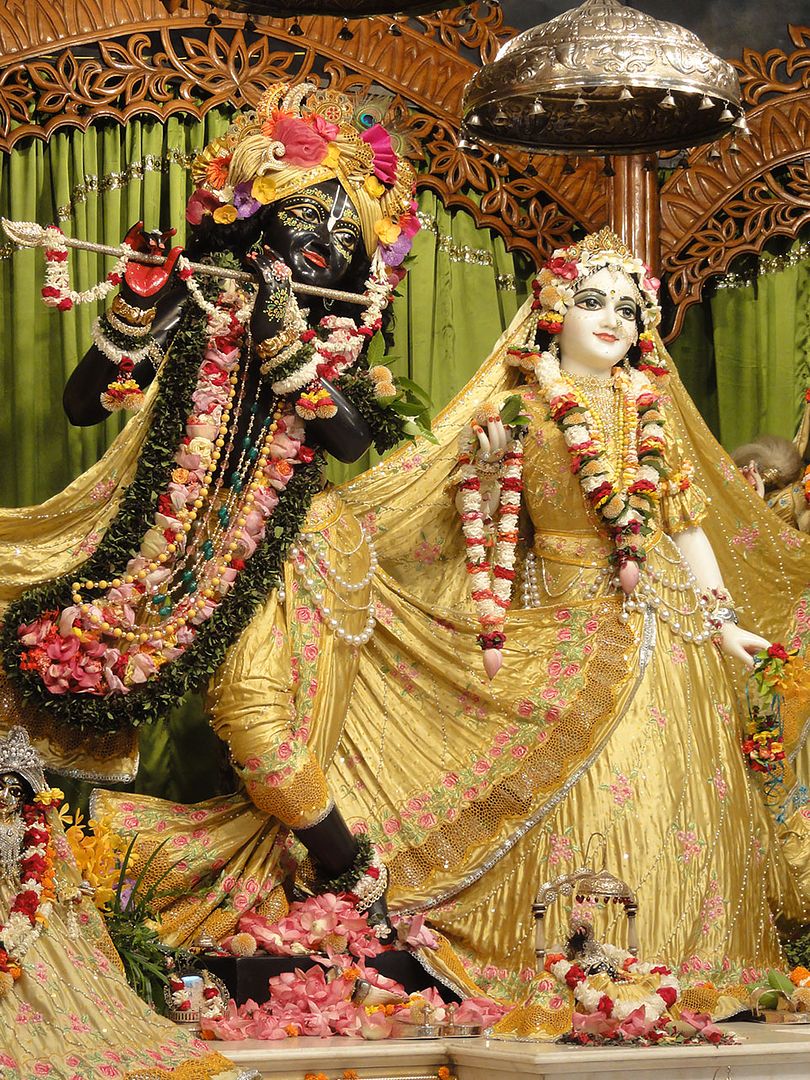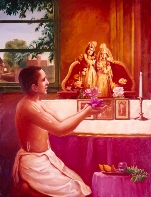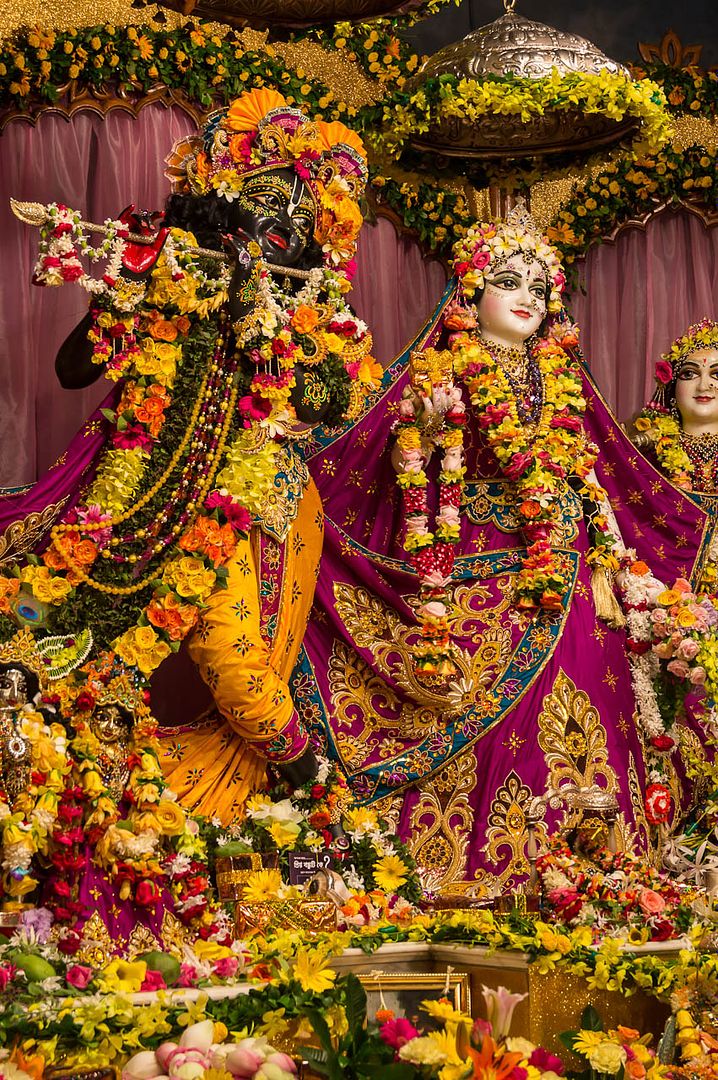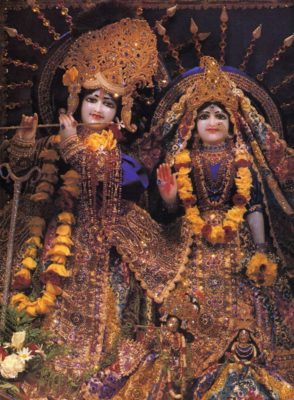PURUSOTTAMA MONTH VRATA (ADHIKA MASA)
2012 18TH AUG - 17TH SEPT
(NEW VERSION BY MAHANIDHI SWAMI)

INTRODUCTION TO PURUSOTTAMA MONTH:
Purusottama month, or adhika masa (extra month) is also called mala masa, which means dirty or useless month. In India the sadhus, sadhakas and pious people of all sampradayas (Vaisnvava and Advaitan) undertake serious penances and austerities (vratas) during Purusottama Month. Now let us examine the name, history, benefits and method of practice of this age old, scripturally bonafide “King of All Vratas” or month long penances.
WHY IS IT CALLED MALA MASA? (dirty or useless month)
This is because all forms of karma-kanda (reward seeking) pujas and yajnas don’t give any results this month. Our Gaudiya Vaisnavas, however, disagree, saying it is called mala masa because devotional activities performed in this month quickly and easily destroy the dirt and contamination caused by sins, ignorance and aparadhas.
WHY IS IT CALLED ADHIKA MAS? (extra month)
It is called adhika (extra) masa because Sri Krsna has placed all His potencies, mercy, blessings in this month, and also because one gets more results from any religious spiritual activities. Thus only works of devotion (Krsna-bhakti) give results in Purusottama month. AND THE RESULTS ARE BIG!!
WHAT MAKES THIS MONTH SO GREAT?
Firstly, the Puranas say that Bhagavan Sri Krsna’s FAVORITE MONTH Purusottama Month. Bhagavan Sri Krsna has not only personally created this month, but He also named it after Himself. Remember, Sri Krsna alone is the Supreme Personality of Godhead, Purusottama. As Swayam Bhagavan Sri Krsna is the most magnanimous, topmost origin of all the avataras and incarnations, Purusottama Month is the topmost, super best, most powerful spiritual reward giving month among all the twelve onths.
Purusottama month is the holiest month, far superior to the pious months of Magha, Vaisakha and Karttika, which the Vedas praise as the three best, reward blessing months of the year. Not only on the earth planet, but all over the universe the Purusottama Month is honored and worshiped by all devotees, sages, demigods and even Laksmi Devi Herself.
BENEFITS OF PURUSOTTAMA MONTH VRATA
If one sincerely worships Radha and Krsna in Purusottama month, he will attain everything he wants. One who observes Purusottama vrata, will burn up the reactions of all his bad karma and attain the direct service of Radha and Krsna. Purusottama month is the best month for all spiritual advancement because Krsna overlooks all the aparadhas. Residence in the holy dhama in P.M. yields 1000 times the benefit.
PURANIC EVIDENCE ON MONTH’S GLORIES
All these sastric quotations are from Padma and Skanda Purana”
1. Lord Sri Krsna: “Purusottama Month has all the power I have to bless its observer. One who follows
Purusottama vrata will destroy all his past sinful reactions. Without performing Purusottama vrata, one cannot perform pure devotional service. The value of Purusottama month is far more valuable than all other types of austerities and religious activities mentioned in the Vedas. Anyone who observes Purusottama vrata will return to my abode, Goloka, at the end of his life."
2. Durvasa Muni: “Just by bathing in a holy river during Purusottama Month, one becomes sinless. The glory of all other months is not equal to one-sixteenth of the glory of the Purusottama Month. By bathing in a holy place, giving charity and chanting the Holy Name of Krsna during Purusottama Month, all miseries are destroyed, one attains all kinds of perfection and fulfills all his desires".
3. Valmiki Muni: "By observing Purusottama vrata, one attains more benefit than performing one hundred horse sacrifices. All holy places live within the body of a Purusottama Month vrati (an observer of this penance). Anyone who faithfully performs Purusottama vrata will go to Goloka Vrndavana".
4. Narada Muni: "Purusottama Month is the best of all months, vratas and austerities. Just by faithfully hearing the glories of Purusottama Month, one attains Krsna-bhakti and immediately nullifies his sinful reactions. One who performs Purusottama vrata properly will attain unlimited piety and spiritual merit (sukrti) and go to the spiritual world".
5. Naimisaranya Sages: "Merciful Purusottama Month acts like a desire tree to fulfill a devotee's desire".
HOW TO OBSERVE THE PURUSOTTAMA MONTH VRATA
OBSERVE celibacy for one month. (Sleep on floor, optional)
Bathe daily BEFORE SUNRISE (best in a holy place, or at least 3 days in a month)
1. Rise and jump out of bed, chanting Jaya Radhe! at brahma-muhurta. (1½ hours before sunrise)
2. Chant Hare Krsna Mahamantra and meditate on Radha-Krsna's beautiful divine forms, qualities, and ecstatically purifying and heart stirring transcendental pastimes in Sridhama Vrndavana. Daily chant fixed number extra rounds for entire month: 24, 32, 64, 108, 192.
3. Maximum Benefits and Bliss by Observing Vrata in Vrndavana, Mayapur or a holy dhama.
4. Daily offer full puja, or at least a ghee lamp to Radha-Krsna Deities or Picture. 33 lamps daily, or at least for one auspicious day this month (ekadasi, sankranti, purnima etc).
5. Daily aratika and parikrama of Tulasi Devi.
6. Daily mandira parikrama (4 times).
7. Daily offer Radha-Krsna Deities or Picture roses, lotus flowers and 100,000 Tulasi leaves (or as many as you can).
8. Daily read Srimad Bhagavatam Radha-Krsna lila ; acaryas say it is a rule to daily read SB Tenth Canto cp. 14 Brahma Stuti. (confirm your reading program with your own guru)
8. A. Hear Radha-Krsna Katha from advanced Gaudiya Vaisnavas.
9. Daily chant Sri Jagannathastakam (because vrata named after and often performed in Purusottma Ksetra Jagannatha Puri Dhama; Espeically focus on chanting and singing astakams, prayers and bhajans glorfying Radha-Krsna Yugala. (with devotees is very powerful and joyful)
10. Take a vow to remain peaceful, and 100% truthful throughout the month.
11. Be careful not to blaspheme any devotees, brahmanas, saints, cows, sastras or especially anyone observing the Purusottama Month Vrata.
12. Don’t ask anyone for anything; be satisfied with whatever you have, and don’t endeavor to acquire any material thing during this month.
13. Try your best to please Radha and Krsna by performing devotional austerities according to your abilities. Don’t break your vow in the middle of the month. Be determined, pray intently for mercy and tolerate your crazy monkey mind. Be deaf to your mind, at least this month.
14. Eat on leaf plates sitting on the floor (optional).
15. No cutting of hair or nails (optional).
16. No cooking in oil or rubbing of oil on your body.
17. No eating or rubbing of mustard oil.
Diets: Be your own guide and choose an eating program that is realistic within your means. The main vrata and austerity is to everyday Krsna consciously associate with serious devotees around the platform of hearing about and glorifying Radha-Krsna in Vrndavana. Best to eat once a day after sunset or at noon the following diets:
i) only milk ; ii) only fruits (no milk, no veg.); iii)no grains (selected veg., fruits, nuts, milk); iv) selected foods (all categories as per caturmasya standards).
INTERESTING VRATA!!!!
Hari-bhakti-vilasa (Vol 4, Vs 437): "During Purusottama Month, one should remember Lord Krsna, and then donate thirty three milk cakes cooked in ghee to grhastha Vaisnava brahmanas, who are well versed in sastras. Failing to do so, one loses all the piety he accumulated in the previous year." Comment: Vrndavana vaisnavas usually observe this by donating two kilos of good quality milk cake from a sweet shop to a few Vaisnava pandas or pujaris or good temple devotees.
ADDITIONAL OBSERVANCES FOR PURUSOTTAMA MONTH
Acaryas say chant daily some japa of Kaundinya Muni’s mantra:
govardhana dharam vande, gopalam gopa rupinam /
gokulutsava me isanam, govindam gopika priyam.
“I worship the lifter of Govardhana Hill, Who has the beautiful form of a cowherd boy, and who continually plays with the gopas. He is the Lord of Gokula wherein everyday is a festival. Daily offer 33 dandavats to Bhagavan Sri Krsna or the vaisnavas.
SRILA BHAKTIVINODA THAKURA’S Purusottama Month VRATA:
Perform the Nirapeksa Vrata, which means 30 days of concentrated, one pointed worship and service to Radha-Govinda Yugala by hearing, chanting, remembering Their divine names, forms, qualities, pastimes. All day and night, hear about Bhagavan Sri Krsna, chant the Hare Krsna Mahamantra, take mahaprasada.
BEST DAYS TO GIVE CHARITY TO DEVOTEE BRAHMANAS:
Ekadasi, Dvadasi, Purnima, Amavasya, Sravana Naksatra Day; DO offer money, gold, cloth, shoes, fruits, etc. Also offer 33 plantains or mangos plus dana and daksina to Brahmanas and Vaisnavas. Very Important Point: With you give dana (i.e. diff. items like cloth, land, gold, cows, books, sweets, flowers, clothing, shoes, umbrellas) to a brahmana, one must simultaneously donate daksina (i.e. money equal to the monetary value of the dana). For example, if give a 300 rupees pair of new shoes, then must give 300 rupees in laksmi or money to that same person.
BREAKING THE PURUSOTTAMA VRATA
1. Day and Time: consult local calendar.
2. Bathe in brahma-muhurta time
3. Perform Deity Worship: Radha-Syamasundara Deities, personal Deities or Picture.
4. Chant this mantra: "O Supreme Lord, O Sanatana, O Purusottama,
O Lord Hari ! I offer my obeisances unto you. May you and your beloved Radhika, please accept my offerings. I offer my repeated obeisances unto Syamasundara, who wears effulgent yellow garments on His beautiful body.
5. Offer puspanjali (handfuls of fresh fragrant flowers or petals) and then dandavat obeisances to Radha- Syamasundara Deities, your personal Deities or Picture.
6. Feed and give charity to 3, 5, 7, 9, 11 brahmanas/ Vaisnavas to the best of your ability (e.g., new clothes, two pairs of shoes, umbrella, ghee, yogurt, gumsas, sweets, lotas, plates: and and then equal value in Laksmi or money. The best charity is to give a Srimad Bhagavatam to a qualified grhastha vaisnava brahmana. This act will deliver all your ancestors to the spiritual world and award them the association of Lord Purusottama!
SPECIFIC VRATA BREAKING ACTIONS
If you ate fruits, ghee, rice, wheat etc, donate the same to brahmanas.
If you slept on the floor, give a bed and pillows to a brahmana.
If you ate on a leaf plate, feed brahmanas with ghee and sugar.
If you didn’t cut nails or hair, donate a mirror to a brahmana.
If you offered ghee lamps, give new lamps and pots to a brahmana
If you broke any rules or regulations during Purusottama vrata, feed different sweet juices to brahmanas.
Mahadeva Lord Siva says that the best charity is to: "Fill a bell metal pot with thirty malpuas (a pancake like sweet), bind the pot with seven new threads and give to a worthy brahmana." Comment: many humble niskincana Vaisnavas have no money or sufficient wealth to donate substantially to brahmanas. But according to your means, donate some small laksmi or some new object to a qualified person, begging for his mercy and blessings. And in your mind, (manasi-seva), you can sincerely donate generously to many good devotees. Remember that sastras say, bhava grahi janardana, Bhagavan Sri Krsna is pleased with the purity and sincerity of one’s attitude, mood love and purity of purpose. Try your best to break your vow by donating something within your means.
WORDS OF ENCOURAGEMENT:
May Giridhari Syama bless everyone with full success in their devotional attempts to observe the Purusottama Month Vrata solely for the divine pleasure of Sri Guru, Nitai Gauranga and our beloveds Radha and Krsna.
PURUSOTTAMA VRATA KI JAI !!!
RADHAGIRIDHARI KI JAI!!!
PREMA DHAMA
SRI VRAJABHUMI
VRNDAVANA DHAMA KI JAI!!!
SRI SYAMA KUNDA, RADHA KUNDA, GIRIGOVARDHANA KI JAI!!!
THE MOST MERCIFUL, ETERNALLY KIND AND LOVING SPIRITUAL FATHER
OF ALL HUMANITY-
SRILA A.C. BHAKTIVEDANTA SWAMI SRILA PRABHUPADA KI JAI!!
JAI JAI SRI RADHEEEEEEEEEEEEEEEEEEE
HARE KRSNA HARE KRSNA KRSNA KRSNA HARE HARE
HARE RAMA HARE RAMA RAMA RAMA HARE HARE HARE
OM TAT SAT


























.jpg)





















